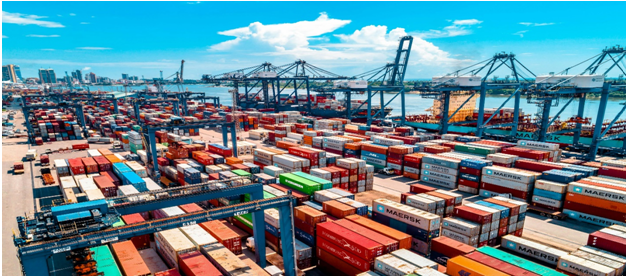INP-WealthPk
Ayesha Saba

ISLAMABAD, Nov. 18 (INP-WealthPK) – A national logistics plan needs to be devised to modernise Pakistan’s port infrastructure, reduce trade costs and boost global competitiveness for sustainable economic growth. Speaking to WealthPK, Ahmed Bilal, Manager of Public Relations at Karachi Port Trust (KPT), said currently, most of the traffic at Karachi Port flows through congested urban roads. He pointed out that existing motorways and national highways were not directly connected to the port, forcing port traffic to pass through Karachi’s city centre, leading to gridlocks and slowing down the movement of cargo. “This lack of streamlined connectivity between the port and key transportation hubs restricts operational efficiency and drives up costs for businesses relying on imports and exports.”
Bilal maintained that delays in transportation were detrimental to the logistics sector, creating a ripple effect that impacted the timeliness of goods reaching their destinations, both locally and internationally. “In a global economy where time is a critical factor, Pakistan’s inefficiencies in port connectivity are undermining its trade potential.” According to him, KPT has been actively pursuing the goal of obtaining direct access to the motorways for efficient freight transportation. “However, the plans drew a blank due to the lack of collaboration among the local, provincial and federal organisations.” Bilal said two circular roads were developed on the Jinnah Bridge and the Korangi Road by the KPT on its own to address this issue. “This infrastructure would provide efficient connectivity between the ports and various inland destinations such as industrial zones, markets and transportation hubs. This, in turn, would attract more international trade and investment, fueling economic growth and development.”
Bilal said that the government should develop a comprehensive national logistics plan that addresses these infrastructure gaps. “The coordination between federal, provincial and local authorities is seen as a key component in improving Pakistan’s port connectivity and overall trade efficiency.” According to the official data, cargo handling at Karachi Port saw a significant 23.43% increase at the end of the fiscal year 2023-24, reaching a total of 51.65 million tonnes. This includes 40.24 million tonnes of dry cargo, a 31.39% rise, and 11.41 million tonnes of liquid bulk cargo, up by 1.69% from the previous fiscal year. The previous year’s total cargo handling stood at 41.85 million tonnes. Export cargo saw a remarkable 47.16% increase, closing at 18.80 million tonnes in FY24 compared to 12.78 million tonnes in FY23.
Credit: INP-WealthPk




